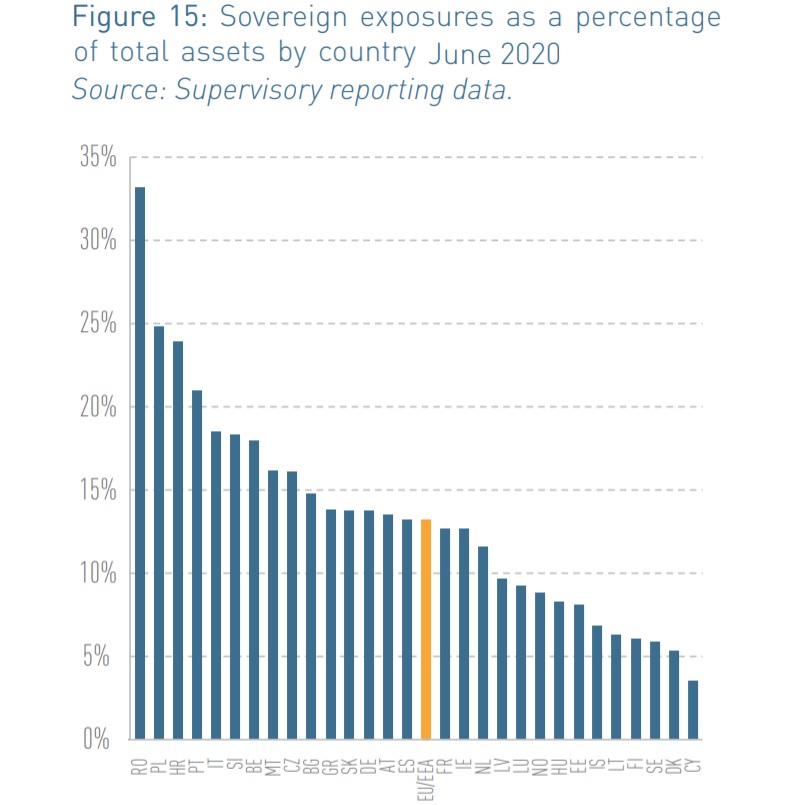Bancile romanesti detin cele mai multe titluri de stat din Europa

Bancile romanesti au cea mai mare pondere a titlurilor de stat din totalul activelor dintre bancile europene, conform datelor publicate de Autoritatea Bancara Europeana (ABE), in raportul anual privind evaluarea riscurilor.
In analiza ABE au fost cuprinse cele mai mari trei banci romanesti: Banca Transilvania, BCR si BRD.
Bancile romanesti detineau, in iunie 2020, titluri de stat reprezentand aproape 35% din totalul activelor, de trei ori mai mult decat media europeana, care se situa la 13% din active.
Bancile poloneze aveau expuneri suverane de 25% din active, cele din Cehia de 16%, cele din Bulgaria de 15% iar bancile din Ungaria sub 10%.
Bancile europene si-au majorat in ultimul an expunerile pe titlurile de stat (suverane) cu 9%, echivalentul a 290 miliarde euro, la un total de 3,4 trilioane euro, conform datelor EBA.
“Cresterea expunerilor suverane ale bancilor poate fi determinata cu rolul stabilizator al bancilor, care asigura cererea de finantare in crestere ale statelor in perioadele de incertitudine si stres economic”, spune ABE in raportul privind evaluarea riscurilor.
“In plus, expunerile suverane sunt active sigure in care bancile pot sa aloce lichiditatea asigurata de masurile de politica monetara”, adauga ABE.
In iunie 2020, 49% din expunerile suverane ale bancilor din UE au fost fata de statele de resedinta, iar 78% fata de un stat din cadrul UE.
Comentarii
Adauga un comentariu
Alte stiri din categoria: Noutati EBA
Bancile romanesti detin cele mai multe titluri de stat din Europa
Bancile romanesti au cea mai mare pondere a titlurilor de stat din totalul activelor dintre bancile europene, conform datelor publicate de Autoritatea Bancara Europeana (ABE), in raportul anual privind evaluarea... detalii
Guidelines on legislative and non-legislative moratoria on loan repayments applied in the light of the COVID-19 crisis
Guidelines on legislative and non-legislative moratoria on loan repayments applied in the light of the COVID-19 crisis – Consolidated version updated on 2 December 20201. Executive summaryThe outbreak of the... detalii
The EBA reactivates its Guidelines on legislative and non-legislative moratoria
After closely monitoring the developments of the COVID-19 pandemic and, in particular, the impact of the second COVID-19 wave and the related government restrictions taken in many EU countries, the European Banking Authority (EBA) has decided to reactivate its Guidelines on legislative and non-legislative moratoria.This reactivation will ensure that loans, which had previously not benefitted from payment moratoria, can now also benefit from them.The role of banks to ensure the continued flow of lending to clients remains of utmost importance and with the reactivation of these Guidelines, the EBA recognises the exceptional circumstances of the second COVID-19 wave.The EBA revised Guidelines, which will apply until 31 March 2021, include additional safeguards against the risk of an undue increase in unrecognised losses on banks’ balance sheet.With the continued unfolding of the COVID-19 pandemic, it is crucial... detalii
EBA publishes 2018 EU-wide stress test results
The European Banking Authority (EBA) published today the results of the 2018 EU-wide stress test, which involved 48 banks from 15 EU and EEA countries, covering broadly 70% of total... detalii
 EBA launches 2018 EU-wide transparency exercise
EBA launches 2018 EU-wide transparency exercise
 EBA issues first binding mediation decision between the SRB and the NBR
EBA issues first binding mediation decision between the SRB and the NBR
 Asset repricing, cyber-attacks and Brexit are key risks for EU financial markets, shows ESA report
Asset repricing, cyber-attacks and Brexit are key risks for EU financial markets, shows ESA report
 EBA publishes its Roadmap on FinTech
EBA publishes its Roadmap on FinTech
 EBA launches 2018 EU-wide stress test exercise
EBA launches 2018 EU-wide stress test exercise
 Opinion on the use of innovative solutions in the customer due diligence process
Opinion on the use of innovative solutions in the customer due diligence process
 EBA Risk Dashboard
EBA Risk Dashboard
 EBA Risk Dashboard confirms steady improvements in the EU banking sector but banks profitability and business model sustainability remain key challenges
EBA Risk Dashboard confirms steady improvements in the EU banking sector but banks profitability and business model sustainability remain key challenges
 EBA report on risks and vulnerabilities in the EU banking sector
EBA report on risks and vulnerabilities in the EU banking sector
 EBA publishes a Discussion Paper on its approach to FinTech
Vezi toate stirile
EBA publishes a Discussion Paper on its approach to FinTech
Vezi toate stirile
Criza COVID-19
- In majoritatea unitatilor BRD se poate intra fara certificat verde
- La BCR se poate intra fara certificat verde
- Firmele, obligate sa dea zile libere parintilor care stau cu copiii in timpul pandemiei de coronavirus
- CEC Bank: accesul in banca se face fara certificat verde
- Cum se amana ratele la creditele Garanti BBVA
Topuri Banci
- Topul bancilor dupa active si cota de piata in perioada 2022-2015
- Topul bancilor cu cele mai mici dobanzi la creditele de nevoi personale
- Topul bancilor la active in 2019
- Topul celor mai mari banci din Romania dupa valoarea activelor in 2018
- Topul bancilor dupa active in 2017
Asociatia Romana a Bancilor (ARB)
- Băncile din România nu au majorat comisioanele aferente operațiunilor în numerar
- Concurs de educatie financiara pentru elevi, cu premii in bani
- Creditele acordate de banci au crescut cu 14% in 2022
- Romanii stiu educatie financiara de nota 7
- Gradul de incluziune financiara in Romania a ajuns la aproape 70%
ROBOR
- ROBOR: ce este, cum se calculeaza, ce il influenteaza, explicat de Asociatia Pietelor Financiare
- ROBOR a scazut la 1,59%, dupa ce BNR a redus dobanda la 1,25%
- Dobanzile variabile la creditele noi in lei nu scad, pentru ca IRCC ramane aproape neschimbat, la 2,4%, desi ROBOR s-a micsorat cu un punct, la 2,2%
- IRCC, indicele de dobanda pentru creditele in lei ale persoanelor fizice, a scazut la 1,75%, dar nu va avea efecte imediate pe piata creditarii
- Istoricul ROBOR la 3 luni, in perioada 01.08.1995 - 31.12.2019
Taxa bancara
- Normele metodologice pentru aplicarea taxei bancare, publicate de Ministerul Finantelor
- Noul ROBOR se va aplica automat la creditele noi si prin refinantare la cele in derulare
- Taxa bancara ar putea fi redusa de la 1,2% la 0,4% la bancile mari si 0,2% la cele mici, insa bancherii avertizeaza ca indiferent de nivelul acesteia, intermedierea financiara va scadea iar dobanzile vor creste
- Raiffeisen anunta ca activitatea bancii a incetinit substantial din cauza taxei bancare; strategia va fi reevaluata, nu vor mai fi acordate credite cu dobanzi mici
- Tariceanu anunta un acord de principiu privind taxa bancara: ROBOR-ul ar putea fi inlocuit cu marja de dobanda a bancilor
Statistici BNR
- Deficitul contului curent, creștere cu 16% în ianuarie 2025
- Deficitul contului curent, aproape 30 miliarde euro în 2024
- Deficitul contului curent, aproape 20 miliarde euro după primele nouă luni
- Deficitul contului curent, aproape 18 miliarde euro după primele opt luni
- Deficitul contului curent, peste 9 miliarde euro pe primele cinci luni
Legislatie
- Decizia nr.105/2007 privind raportarea la Biroul de Credit
- Legea nr. 311/2015 privind schemele de garantare a depozitelor şi Fondul de garantare a depozitelor bancare
- Rambursarea anticipata a unui credit, conform OUG 50/2010
- OUG nr.21 din 1992 privind protectia consumatorului, actualizata
- Legea nr. 190 din 1999 privind creditul ipotecar pentru investiții imobiliare
Lege plafonare dobanzi credite
- Care este dobanda maxima la un credit IFN?
- BNR propune Parlamentului plafonarea dobanzilor la creditele bancilor intre 1,5 si 4 ori peste DAE medie, in functie de tipul creditului; in cazul IFN-urilor, plafonarea dobanzilor nu se justifica
- Legile privind plafonarea dobanzilor la credite si a datoriilor preluate de firmele de recuperare se discuta in Parlament (actualizat)
- Legea privind plafonarea dobanzilor la credite nu a fost inclusa pe ordinea de zi a comisiilor din Camera Deputatilor
- Senatorul Zamfir, despre plafonarea dobanzilor la credite: numai bou-i consecvent!
Anunturi banci
- BCR este inchisa vineri, 18 aprilie, si luni, 21 aprilie
- Cererile de transfer de bani prin Whatsapp, Telegram, Messenger sunt fraude
- Un telefon sau mesaj care pare de la banca poate fi frauda
- Cererea unui ajutor in bani poate fi o inselaciune
- Cate reclamatii primeste Intesa Sanpaolo Bank si cum le gestioneaza
Analize economice
- Deficitul contului curent, creștere cu 85% pe primele două luni din 2025
- Inflația anuală, redusă la 4,86%
- Comerțul, a cincea lună consecutivă de ajustare a creșterii
- Pensia reală a crescut cu peste 15% anul trecut
- Deficitul bugetar, rezultat slab după primele două luni
Ministerul Finantelor
- Deficitul bugetar, din ce în ce mai mare la început de an
- -8,65% din PIB, deficit bugetar pe anul 2024
- Datoria publică, 51,4% din PIB la mijlocul anului
- Deficit bugetar de 3,6% din PIB după prima jumătate a anului
- Deficit bugetar de 3,4% din PIB după primele cinci luni ale anului
Biroul de Credit
- FUNDAMENTAREA LEGALITATII PRELUCRARII DATELOR PERSONALE IN SISTEMUL BIROULUI DE CREDIT
- BCR: prelucrarea datelor personale la Biroul de Credit
- Care banci si IFN-uri raporteaza clientii la Biroul de Credit
- Ce trebuie sa stim despre Biroul de Credit
- Care este procedura BCR de raportare a clientilor la Biroul de Credit
Procese
- ANPC pierde un proces cu Intesa si ARB privind modul de calcul al ratelor la credite
- Un client Credius obtine in justitie anularea creditului, din cauza dobanzii prea mari
- Hotararea judecatoriei prin care Aedificium, fosta Raiffeisen Banca pentru Locuinte, si statul sunt obligati sa achite unui client prima de stat
- Decizia Curtii de Apel Bucuresti in procesul dintre Raiffeisen Banca pentru Locuinte si Curtea de Conturi
- Vodafone, obligata de judecatori sa despagubeasca un abonat caruia a refuzat sa-i repare un telefon stricat sau sa-i dea banii inapoi (decizia instantei)
Stiri economice
- Deficitul comercial pe primele două luni ale anului, majorat cu 35%
- România, campioana europeană la șomajul tinerilor
- România, pe locul trei în UE la creșterea costului salarial în T4 2024
- Producția industrială, scădere conjuncturală în ianuarie 2025
- Datoria publică, 54,6% din PIB la finele lui 2024
Statistici
- România, marginal peste Estonia la inflația anuală
- România, a doua țară din UE ca pondere a salariaților cu venituri mici
- România, pe locul trei în UE la creșterea costului muncii în T2 2024
- Cheltuielile cu pensiile - România, pe locul 19 în UE ca pondere în PIB
- Dobanda din Cehia a crescut cu 7 puncte intr-un singur an
FNGCIMM
- Programul IMM Invest continua si in 2021
- Garantiile de stat pentru credite acordate de FNGCIMM au crescut cu 185% in 2020
- Programul IMM invest se prelungeste pana in 30 iunie 2021
- Firmele pot obtine credite bancare garantate si subventionate de stat, pe baza facturilor (factoring), prin programul IMM Factor
- Programul IMM Leasing va fi operational in perioada urmatoare, anunta FNGCIMM
Calculator de credite
- ROBOR la 3 luni a scazut cu aproape un punct, dupa masurile luate de BNR; cu cat se reduce rata la credite?
- In ce mall din sectorul 4 pot face o simulare pentru o refinantare?
Noutati BCE
- Dobanda la euro scade la 2,25%
- Acord intre BCE si BNR pentru supravegherea bancilor
- Banca Centrala Europeana (BCE) explica de ce a majorat dobanda la 2%
- BCE creste dobanda la 2%, dupa ce inflatia a ajuns la 10%
- Dobânda pe termen lung a continuat să scadă in septembrie 2022. Ecartul față de Polonia și Cehia, redus semnificativ
Noutati EBA
- Bancile romanesti detin cele mai multe titluri de stat din Europa
- Guidelines on legislative and non-legislative moratoria on loan repayments applied in the light of the COVID-19 crisis
- The EBA reactivates its Guidelines on legislative and non-legislative moratoria
- EBA publishes 2018 EU-wide stress test results
- EBA launches 2018 EU-wide transparency exercise
Noutati FGDB
- Banii din banci sunt garantati, anunta FGDB
- Depozitele bancare garantate de FGDB au crescut cu 13 miliarde lei
- Depozitele bancare garantate de FGDB reprezinta doua treimi din totalul depozitelor din bancile romanesti
- Peste 80% din depozitele bancare sunt garantate
- Depozitele bancare nu intra in campania electorala
CSALB
- Sistemul bancar romanesc este deosebit de bine pregatit pentru orice fel de socuri
- La CSALB poti castiga un litigiu cu banca pe care l-ai pierde in instanta
- Negocierile dintre banci si clienti la CSALB, in crestere cu 30%
- Sondaj: dobanda fixa la credite, considerata mai buna decat cea variabila, desi este mai mare
- CSALB: Romanii cu credite caută soluții pentru reducerea ratelor. Cum raspund bancile
First Bank
- Ce trebuie sa faca cei care au asigurare la credit emisa de Euroins
- First Bank este reprezentanta Eurobank in Romania: ce se intampla cu creditele Bancpost?
- Clientii First Bank pot face plati prin Google Pay
- First Bank anunta rezultatele financiare din prima jumatate a anului 2021
- First Bank are o noua aplicatie de mobile banking
Noutati FMI
- FMI: criza COVID-19 se transforma in criza economica si financiara in 2020, suntem pregatiti cu 1 trilion (o mie de miliarde) de dolari, pentru a ajuta tarile in dificultate; prioritatea sunt ajutoarele financiare pentru familiile si firmele vulnerabile
- FMI cere BNR sa intareasca politica monetara iar Guvernului sa modifice legea pensiilor
- FMI: majorarea salariilor din sectorul public si legea pensiilor ar trebui reevaluate
- IMF statement of the 2018 Article IV Mission to Romania
- Jaewoo Lee, new IMF mission chief for Romania and Bulgaria
Noutati BERD
- Creditele neperformante (npl) - statistici BERD
- BERD este ingrijorata de investigatia autoritatilor din Republica Moldova la Victoria Bank, subsidiara Bancii Transilvania
- BERD dezvaluie cat a platit pe actiunile Piraeus Bank
- ING Bank si BERD finanteaza parcul logistic CTPark Bucharest
- EBRD hails Moldova banking breakthrough
Noutati Federal Reserve
- Federal Reserve anunta noi masuri extinse pentru combaterea crizei COVID-19, care produce pagube "imense" in Statele Unite si in lume
- Federal Reserve urca dobanda la 2,25%
- Federal Reserve decided to maintain the target range for the federal funds rate at 1-1/2 to 1-3/4 percent
- Federal Reserve majoreaza dobanda de referinta pentru dolar la 1,5% - 1,75%
- Federal Reserve issues FOMC statement
Noutati BEI
- BEI a redus cu 31% sprijinul acordat Romaniei in 2018
- Romania implements SME Initiative: EUR 580 m for Romanian businesses
- European Investment Bank (EIB) is lending EUR 20 million to Agricover Credit IFN
Mobile banking
- Comisioanele BRD pentru MyBRD Mobile, MyBRD Net, My BRD SMS
- Termeni si conditii contractuale ale serviciului You BRD
- Recomandari de securitate ale BRD pentru utilizatorii de internet/mobile banking
- CEC Bank - Ghid utilizare token sub forma de card bancar
- Cinci banci permit platile cu telefonul mobil prin Google Pay
Noutati Comisia Europeana
- Avertismentul Comitetului European pentru risc sistemic (CERS) privind vulnerabilitățile din sistemul financiar al Uniunii
- Cele mai mici preturi din Europa sunt in Romania
- State aid: Commission refers Romania to Court for failure to recover illegal aid worth up to €92 million
- Comisia Europeana publica raportul privind progresele inregistrate de Romania in cadrul mecanismului de cooperare si de verificare (MCV)
- Infringements: Commission refers Greece, Ireland and Romania to the Court of Justice for not implementing anti-money laundering rules
Noutati BVB
- BET AeRO, primul indice pentru piata AeRO, la BVB
- Laptaria cu Caimac s-a listat pe piata AeRO a BVB
- Banca Transilvania plateste un dividend brut pe actiune de 0,17 lei din profitul pe 2018
- Obligatiunile Bancii Transilvania se tranzactioneaza la Bursa de Valori Bucuresti
- Obligatiunile Good Pople SA (FRU21) au debutat pe piata AeRO
Institutul National de Statistica
- România, la 78% din PIB-ul mediu pe locuitor al UE
- Producția industrială, la cota -1,8% după 11 luni din 2024
- Deficitul contului curent, peste 26 miliarde euro în noiembrie 2024
- Comerțul cu amănuntul - în creștere cu 8% pe primele 10 luni
- Deficitul balanței comerciale la 9 luni, cu 15% mai mare față de aceeași perioadă a anului trecut
Informatii utile asigurari
- Data de la care FGA face plati pentru asigurarile RCA Euroins: 17 mai 2023
- Asigurarea împotriva dezastrelor, valabilă și in caz de faliment
- Asiguratii nu au nevoie de documente de confirmare a cutremurului
- Cum functioneaza o asigurare de viata Metropolitan pentru un credit la Banca Transilvania?
- Care sunt documente necesare pentru dosarul de dauna la Cardif?
ING Bank
- La ING se vor putea face plati instant din decembrie 2022
- Cum evitam tentativele de frauda online?
- Clientii ING Bank trebuie sa-si actualizeze aplicatia Home Bank pana in 20 martie
- Obligatiunile Rockcastle, cel mai mare proprietar de centre comerciale din Europa Centrala si de Est, intermediata de ING Bank
- ING Bank transforma departamentul de responsabilitate sociala intr-unul de sustenabilitate









